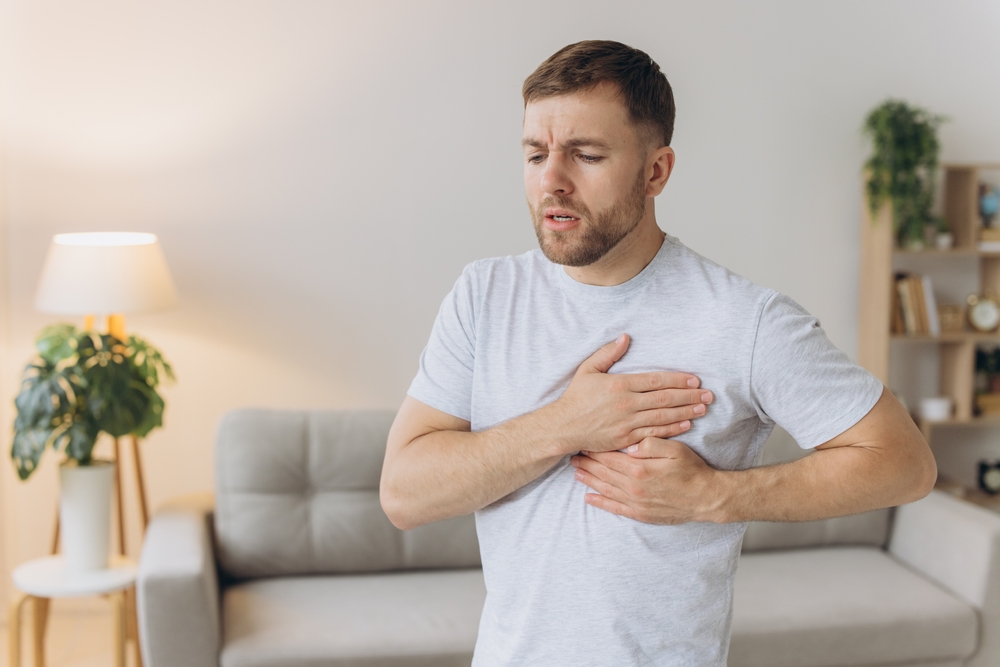Last Updated:
July 21st, 2025
Panic Attacks Caused by Addiction
For many people living with drug or alcohol addiction, panic attacks are a regular and deeply unsettling part of daily life. They can creep in slowly or slam you without warning, leaving you panicked, scared and even worried that you’re having a stroke or a heart attack. The relationship between addiction and panic attacks is complicated, but it is very real and surprisingly common. Understanding this link and how to break it is incredibly important for protecting yourself now while working towards lasting recovery.

What are panic attacks?
Panic attacks are intense episodes of fear or anxiety that can hit without warning and leave you feeling completely out of control, both physically and emotionally. In fact, panic attack symptoms can be so overwhelming that many people believe they are having a heart attack or some other life-threatening emergency.
During a panic attack, your body activates its emergency system, often called the fight-or-flight response. And yet, it is very common to have no idea where the panic attack has come from. Episodes usually peak within ten to twenty minutes but the effects can last much longer with many people feeling drained, anxious or spaced out for hours afterwards.
Panic attacks can be triggered by a number of things, including stress, trauma, hormonal changes or underlying anxiety conditions. They can also be linked to substance use, withdrawal or the long-term effects of addiction, which can leave your nervous system raw and hyperreactive.
How does addiction cause panic attacks?
Substance use can have a huge impact on your mental health, and panic attacks are one of the most intense symptoms people face during or after alcohol or drug addiction. For some people, panic attacks are a side effect of the substances themselves, but for others, panic attack symptoms hit during withdrawal or continue well into recovery.
Stimulants like cocaine, meth and cannabis can overstimulate your brain and nervous system while other drugs like heroin and opioids impact the brain chemicals that regulate fear, stress and mood. When these systems and chemicals are affected, your body can go into crisis mode, resulting in a drug-induced panic attack with scary symptoms like heart palpitations, chest tightness and rapid breathing.
Alcoholism panic attacks are also common, especially in people who drink heavily to sleep or to cope with anxiety. Alcohol numbs feelings in the short term, but with long-term heavy drinking, it can dramatically alter your brain chemistry. This can cause intense alcohol mood swings and sudden panic episodes, especially late at night, first thing in the morning or during withdrawal.
Even in recovery, many people still experience panic attack symptoms as emotions can become overwhelming without the buffer of drugs and alcohol. However, this is part of the healing process, and the right support in rehab treatment can help you manage anything that comes your way.
What are some common symptoms of a panic attack to look out for?
Panic attacks don’t always look how you might expect, and you may not be able to tell what’s happening inside. Not everyone having a panic attack is visibly distressed, but here are some physical panic attack symptoms to look out for:
Can panic attacks be dangerous if left unaddressed?
Even though they feel like an emergency, drug or alcohol panic attacks themselves aren’t physically dangerous, they can mimic all the symptoms of a heart attack, stroke or respiratory emergency, but once they pass, you should be physically fine.
However, living in constant fear of panic attacks can be very tough mentally and emotionally. You might stop going out or avoid any place where you think an attack could happen. It’s exhausting to live like that and can slowly chip away at your confidence, causing a complete lack of motivation.
For people in addiction or recovery, panic attacks can be especially risky. You might increase your drug or alcohol use just to avoid feeling that way again, only for a panic attack to push you closer to relapse. Panic attacks also often point to deeper issues like trauma or chronic anxiety from long-term substance use, which need to be addressed effectively during rehab.

What should I do if I or a loved one is experiencing panic attacks caused by addiction?
Addiction Helper knows how scary alcohol and drug-induced panic attacks can be. The symptoms can be frighteningly similar to life-threatening conditions, and the constant fear of the next attack can make daily life a struggle. Getting effective treatment and support for the underlying substance abuse issues can make all the difference. Contact us today for free expert advice and some much-needed relief and reassurance.
Our compassionate team are ready and available to take your call, and guide you towards lasting the lasting addiction recovery you deserve.

